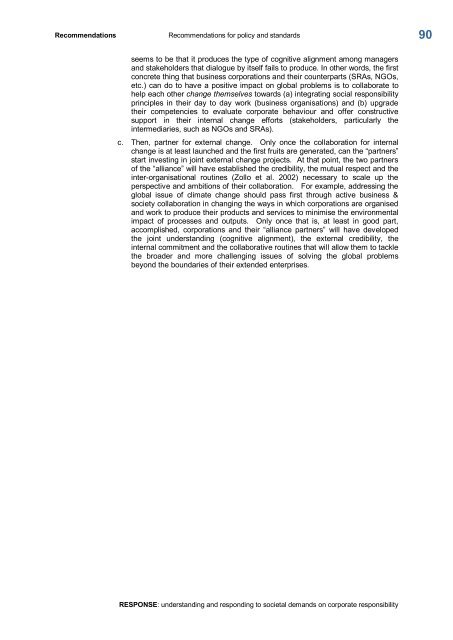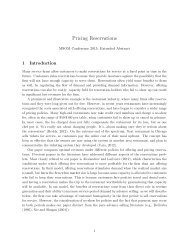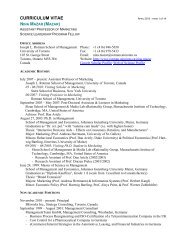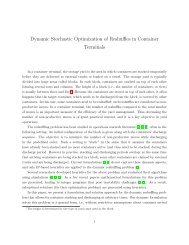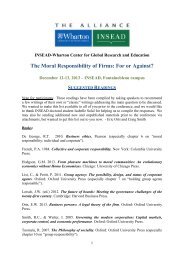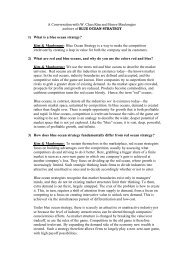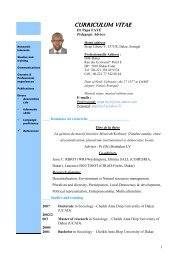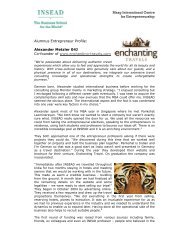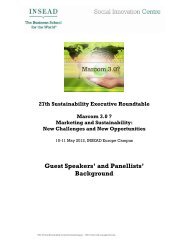Recommendations Recommendations for policy and standards seems to be that it produces the type of cognitive alignment among managers and stakeholders that dialogue by itself fails to produce. In other words, the first concrete thing that business corporations and their counterparts (SRAs, NGOs, etc.) can do to have a positive impact on global problems is to collaborate to help each other change themselves towards (a) integrating social responsibility principles in their day to day work (business organisations) and (b) upgrade their competencies to evaluate corporate behaviour and offer constructive support in their internal change efforts (stakeholders, particularly the intermediaries, such as NGOs and SRAs). c. Then, partner for external change. Only once the collaboration for internal change is at least launched and the first fruits are generated, can the “partners” start investing in joint external change projects. At that point, the two partners of the “alliance” will have established the credibility, the mutual respect and the interorganisational routines (Zollo et al. 2002) necessary to scale up the perspective and ambitions of their collaboration. For example, addressing the global issue of climate change should pass first through active business & society collaboration in changing the ways in which corporations are organised and work to produce their products and services to minimise the environmental impact of processes and outputs. Only once that is, at least in good part, accomplished, corporations and their “alliance partners” will have developed the joint understanding (cognitive alignment), the external credibility, the internal commitment and the collaborative routines that will allow them to tackle the broader and more challenging issues of solving the global problems beyond the boundaries of their extended enterprises. <strong>RESPONSE</strong>: understanding and responding to societal demands on corporate responsibility 90
Recommendations Recommendations for policy and standards REFERENCES Ackerstein, D. S. and Lemon K.A. 1999. Greening the brand Environmental marketing strategies and the American consumer. Charter M., Polonsky J., and (eds.). Greener Marketing a global perspective on greening marketing practice. Sheffield, Greenleaf Publishing. Aftanas L. I., & Golocheikine S. A. 2002 Nonlinear dynamic complexity of the human EEG during meditation. Neuroscience Letters, 330(2), 143–146. Aftanas L. I., & Golocheikine S. A. 2001. Human anterior and frontal midline theta and lower alpha reflect emotionally positive state and internalized attention: high resolution EEG investigation of meditation. Neuroscience Letters, 310(1), 57–60. Axelrod, R. 1976. Structure of decision: The causal maps of political elites. Princeton Univ Press. Batson, C. 1991. The altruism question: Toward a socialpsychological answer. Hillsdale NJ, Erlbaum. Boeker, W. 1989. Strategic change: The effects of founding and history, Academy of Management Journal, 32(3), 489505. Cahn, B.R. and Polich,J. 2006 Meditation states and traits: EEG, ERP, and neuroimaging studies.. Psychological Bulletin, 132(2), 180. Cannon, T. 1994. Corporate responsibility. Edinburgh Gate, Harlow, England: Pearson Education Limited. Carroll, A. B. 1979. A threedimensional model of corporate performance. Academy of Management Review, 4(4), 497505. Carroll, A. B. and Buchholtz, A. K. 1999. Business & society Ethics and stakeholder management. SouthWestern College Publishing. Chatterji, A.K., Levine, D.I. and Toffel, M.W. 2007. How well do social ratings actually measure corporate social responsibility? Harvard Business School Working Paper, No. 07051. Christmann, P. and Taylor, G. 2001. Globalization and the environment: Determinants of firm self regulation in China. Journal of International Business Studies, 32(Third Quarter 2001), 439458. Cyert, R. M. and March, J. G. 1992. A behavioral theory of the firm. Blackwell Business. DiMaggio, P. and Powell, W. 1983. The iron cage revisited: Institutional isomorphism and collective rationality in organizational fields. American Sociological Review, 48:147160. Donaldson, T. and Preston, L. E. 1995. The stakeholder theory of the corporation: Concepts, evidence and implications. Academy of Management Review, 20(1), 6591. Dutton J.E, and Jackson S.E. 1987. Categorizing strategic issues: Links to organizational action. Academy of Management Review, 12, 76. EC. 2001. Green Paper Promoting a European framework for corporate social responsibility. Bruxelles,The European Commission. Eisenberg, N and Strayer, P. 2003. Critical issues in the study of empathy. In, Eisenberg, N and Strayer, P. Eds. Empathy and its development. New York: Cambridge University Press Eisenhardt, K. M. 1989. Building theories from case study research. Academy of Management Review, 14, 532. Elenkov, D. S. 1997. Strategic uncertainty and environmental scanning: The case for institutional influences on scanning behavior. Strategic Management Journal, 18(4), 287302. Fiske, S. T. and Taylor, S. E. 1991. Social cognition. New York: McGraw Hill. Frederick, W. 1960. The growing concern over business responsibility. California Management Review, 2(4), 5461. Freeman, R. E. 1984. Strategic management: A stakeholder approach. Boston, Pitman Publishing. Freeman, R. E. and Reed, D. 1998. Stockholders and Stakeholders: A new Perspective on Corporate Governance. De Wit, B. and Meyer, R. Strategy, process, content, context. 829837. Gautreau, A. and Kleiner, B. H. 2001. Recent trends in performance measurement systems the balance scorecard approach. Management Research News, 24, 153156. Gilbert, C. 2005. Unbundling the structure of inertia: Resource versus routine rigidity. Academy of Management Journal, 48: 741763. Ghoshal, S. and Bartlett, C. A. 1995. Changing the role of top management: Beyond structure to process. Harvard Business Review, 73(1), 8694. Giddens A. 2001. Sociology. Polity Press. GodfreySmith, P., 1996. Complexity and the function of mind in nature. Cambridge University Press. Goleman, D. 1995. Emotional intelligence. New York, Bantam. Granovetter M. 1985. Economic action and social structure: The problem of embeddedness. American Journal of Sociology, 91, 481510. <strong>RESPONSE</strong>: understanding and responding to societal demands on corporate responsibility 91


